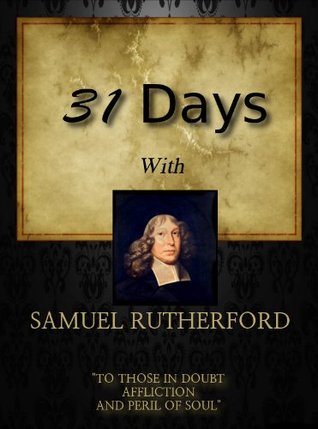- Bible
- Read the Bible
- Bible Versions
- Verse of the Day
- Reading Plans
- Verses by Topic
- Books of the Bible
- Bible Images
- Study
- Commentaries
- Concordances
- Dictionaries
- Encyclopedias
- Sermons
- Bible Atlas & Maps
- BP Wiki
- Devotionals
- Today's Devotionals
- Light of the World
- All Devotionals
- Inspirational Quotes
- More
- Picture Quotes
- Videos
- Inspirational
- Bible Study
- What The Bible Says
- Bible Q&As
- Daily Bread
- Bible by Genre
- Bible Stories
- Random Bible Verse
- Community
- Store
31 Days with Samuel Rutherford
by Samuel Rutherford
There are two volumes of Letters of Samuel Rutherford numbering 365 unique entries. Almost two-thirds were written during his eighteen month exile at Aberdeen in the North of Scotland. What is before you are certain extracts of these letters, divided up into 31 days of devotional thoughts. You will notice that Rutherford's entries are almost epistolarian in from. He reflects in his own way, the pastoral heart of a true servant of Christ, and never shrinks back from displaying his own struggles and triumphs to his readers.
The Puritan Richard Baxter once said of these letters, "Hold off [do not count] the Bible, and such a book as this the world never saw."
Rutherford died as he lived, loving Christ with a passion that few have known on this earth. In his last moments on this earth he was gripped with a singular rapture and elevation of spirit. To quote Andrew Thompson in his biography on the author, "On repeated occasions he cried aloud, 'Oh for a well-tuned harp!' as if he already heard the sound of the radiant worshippers, and yearned with a holy impatience to join them in their "heavenly symphonies and sweet societies."
He passed from this world to the next on the morning of March 20, 1661, his last words being, "Glory, glory dwelleth in Immanuel's land!" His earthly remains are buried in the St. Andrews Church Kirk-yard.
For the inspiration of this devotional, I am indebted to Hembert Westley's work titled, A New Epistle: Being the Wise and Beautiful Counsel of that Saintly Man, Samuel Rutherford, to all Those in Doubt, in Affliction, and in Peril of their Souls. The pagination, formatting, slight update, and archaic word explanation are mine. The rest belongs to Samuel Rutherford. I hope you enjoy these devotional thoughts as much as I did.
The Puritan Richard Baxter once said of these letters, "Hold off [do not count] the Bible, and such a book as this the world never saw."
Rutherford died as he lived, loving Christ with a passion that few have known on this earth. In his last moments on this earth he was gripped with a singular rapture and elevation of spirit. To quote Andrew Thompson in his biography on the author, "On repeated occasions he cried aloud, 'Oh for a well-tuned harp!' as if he already heard the sound of the radiant worshippers, and yearned with a holy impatience to join them in their "heavenly symphonies and sweet societies."
He passed from this world to the next on the morning of March 20, 1661, his last words being, "Glory, glory dwelleth in Immanuel's land!" His earthly remains are buried in the St. Andrews Church Kirk-yard.
For the inspiration of this devotional, I am indebted to Hembert Westley's work titled, A New Epistle: Being the Wise and Beautiful Counsel of that Saintly Man, Samuel Rutherford, to all Those in Doubt, in Affliction, and in Peril of their Souls. The pagination, formatting, slight update, and archaic word explanation are mine. The rest belongs to Samuel Rutherford. I hope you enjoy these devotional thoughts as much as I did.
BUY NOW
Kindle Edition, 57 pages
Published February 13th 2013 by Lewis Publishing
© 2025 Bibleportal.com All rights reserved.

Rutherford was also known for his spiritual and devotional works, such as Christ Dying and drawing Sinners to Himself and his Letters. Concerning his Letters, Charles Spurgeon wrote: "When we are dead and gone let the world know that Spurgeon held Rutherford's Letters to be the nearest thing to inspiration which can be found in all the writings of mere men". Published versions of the Letters contain 365 letters and fit well with reading one per day.
Rutherford was a strong supporter of the divine right of Presbytery, the principle that the Bible calls for Presbyterian church government. Among his polemical works are Due Right of Presbyteries (1644), Lex, Rex (1644), and Free Disputation against Pretended Liberty of Conscience.
Samuel Rutherford was a Scottish Presbyterian theologian and author. He was one of the Scottish Commissioners to the Westminster Assembly.
Born in the village of Nisbet, Roxburghshire, Rutherford was educated at Edinburgh University, where he became in 1623 Regent of Humanity (Professor of Latin). In 1627 he was settled as minister of Anwoth in Galloway, from where he was banished to Aberdeen for nonconformity. His patron in Galloway was John Gordon, 1st Viscount of Kenmure. On the re-establishment of Presbytery in 1638 he was made Professor of Divinity at St. Andrews, and in 1651 Rector of St. Mary's College there. At the Restoration he was deprived of all his offices.
Rutherford's political book Lex, Rex (meaning "the law [and] the king" or "the law [is] king") presented a theory of limited government and constitutionalism. It was an explicit refutation of the doctrine of "Rex Lex" or "the king is the law." Rutherford was also known for his spiritual and devotional works, such as Christ Dying and drawing Sinners to Himself and his Letters.
... Show more